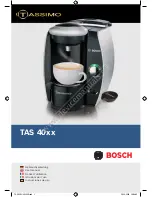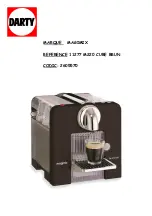
8
9
Espresso Prep:
1. Scoop your finely ground espresso into the portafilter.
• For 2 servings of Espresso, fill portafilter to the 2 cup line located inside the portafilter.
• For 4 servings of Espresso, fill portafilter to the 4 cup line located inside the portafilter.
2. Lightly tamp the espresso in the portafilter by pushing down with the back of the Measuring
Scoop/Tamper. (If tamped too much, the water will not go though the espresso.)
3. Insert the portafilter into machine. This can be tricky the first time you try, so don’t
worry. The best way to learn is to look at the shape of the top of the portafilter.
It can be inserted by placing it from the left and locking it into the right. This may
require force but with time this will get easier. The handle should be pointing
directly at you when standing in front of the machine.
Time to Brew and Froth
:
1.
The glass carafe lid is specially designed to fit underneath the portafilter spout to
prevent splashing. Simply place the glass carafe onto the drip tray and slide the
opening at the top of the lid into the spout of the portafilter.
2.
Pour in your desired amount of cold milk into a Stainless Steel
Frothing pitcher (or ceramic mug), but allow enough room for
expansion of the foam (typically 1/3 of the top). Do Not Use
the Glass Carafe!
a. For 1 cup use approximately 4 oz of milk.
b. For 2 cups use 8 oz of milk.
*Frothing texture is highly dependent upon the milk type
used. 2% is recommended; whole milk creates finer
bubbles while skim milk creates larger bubbles.
3.
Plug in the Machine and turn knob on the left side of the
machine to “Brew”.
4.
Once the coffee begins to brew into the Glass Carafe, place
your stainless steel frothing pitcher so that the Frothing Wand
is submerged into the milk (Figure 2).
5.
Turn the knob to “Steam” (Figure 3). This will take a few
seconds to heat up before bubbling. Move the pitcher in a
circular motion until desired amount of froth is reached.
*Frothing is a learned skill however, the more you froth the
easier it is to learn how to make the perfect texture. The
experts recognize it visually and by sound. The bubbles of the
foam will be very tiny and as the milk changes consistency, so
does the sound. These are signals that help you determine when your milk is ready.
6.
Before removing the frothing pitcher from underneath the Frothing Wand, turn the
knob back into the “Brew” position to complete the brewing process.
7.
When the espresso finishes brewing, turn the knob into the off position and
unplug the machine.
8. Follow “HOW TO RELEASE PRESSURE BEFORE REMOVING WATER RESERVOIR LID” on
page7.
Build Your Beverage:
1. Grab your favorite drinking mug. (Most coffee houses place syrups or sweeteners
in the bottom of the drinking cup first.)
2. Then pour the espresso into your drinking mug.
3. Finally, pour froth into your mug, then stir and enjoy.
*A Latte has less foam and more steamed milk than a cappuccino. A cappuccino
has 1/3 of espresso, 1/3 of steamed milk and 1/3 milk foam whereas a latte has 1/3
espresso, 2/3 steamed milk topped with milk foam.
Express Clean Up:
1. Rinse carafe and stainless steel frothing pitcher.
FIGURE 2
Submerge Frothing
Wand in milk
FIGURE 3
Turn knob to STEAM
CAUTION:
DO NOT remove Reservoir Cap or Portafilter at any time while the
appliance is under pressure or until the appliance has cooled down.
2. Fill Water Glass Carafe halfway to the steam mark with water and
pour into the Water Reservoir.
3. Screw cap back onto the Water Reservoir and plug in the machine.
4. Fill stainless steel frothing pitcher half way with water and place
your stainless steel frothing pitcher so that the Frothing Wand is
submerged into the water.
5. Turn the knob to “Steam” and steam with water instead of milk for
30 seconds. This will help rinse the internal parts of the machine.
6. Place the frothing pitcher with water underneath the portafilter
and turn knob to “Brew”. Once the steam stops, turn the knob
to the “Off” position.
7. Once the Frothing Wand is cool, remove and rinse Frothing Wand.
(The Frothing Wand is the black rubber piece at the tip of the
frothing wand. Simply pull from the bottom to remove.)
8. Wipe down frothing wand with a damp cloth and rinse the Frothing Wand.
9. Remove portafilter. Flip the filter lock so that the filter stays in place while dumping
grinds. (Figure 4)
10. Rinse portafilter with fresh water. Please note that the portafilter is NOT dishwasher safe.
HOW TO MAKE ESPRESSO:
Water Prep:
Caution:
DO NOT remove Water Reservoir Cap or Portafilter at any time while the
appliance is under pressure or until the appliance has cooled down.
1. Fill the Water Reservoir with water by removing the Water reservoir Cap.
• For 2 servings of Espresso, fill Glass Carafe to the 2 cup mark and pour into reservoir.
• For 4 servings of Espresso, fill Glass Carafe to the 4 cup mark and pour into reservoir.
2. Screw cap back onto water reservoir.
Espresso Prep:
1. Scoop your finely ground espresso into the portafilter.
• For 2 servings of Espresso, fill portafilter to the 2 cup line located inside the portafilter.
• For 4 servings of Espresso, fill portafilter to the 4 cup line located inside the portafilter.
2. Lightly tamp the espresso in the portafilter (push down with the back of the
scooper/spoon).
3. Insert the portafilter into machine. This can be tricky the first time you try, so don’t
worry. The best way to learn is to look at the shape of the top of the portafilter.
It can be inserted by placing it from the left and locking it into the right. This may
require force but with time this will get easier. The handle should be pointing
directly at you when standing in front of the machine.
Time to Brew:
1. The glass carafe lid is specially designed to fit underneath the portafilter spout to
prevent splashing. Simply place the glass carafe onto the drip tray and slide the
opening at the top of the lid into the spout of the portafilter.
2. Turn the knob on the left side of the machine to “Brew”. Keep the knob on brew until
the espresso finishes brewing, then turn off by rotating the knob to the “Off” position.
3. Pour into your favorite drinking mug and enjoy.
Express Clean Up:
1. Rinse glass carafe.
Caution:
DO NOT remove Water Reservoir Cap or Portafilter at any time while the
appliance is under pressure or until the appliance has cooled down.
2. Remove portafilter. Flip the filter lock so that the filter stays in place while dumping grinds.
3. Rinse portafilter with fresh water.
FIGURE 4
Flip the filter lock
so that the filter
stays in place while
dumping grinds.
BVMC-ECM160_16ESM1.indd 9-10
4/19/16 9:54 AM
































